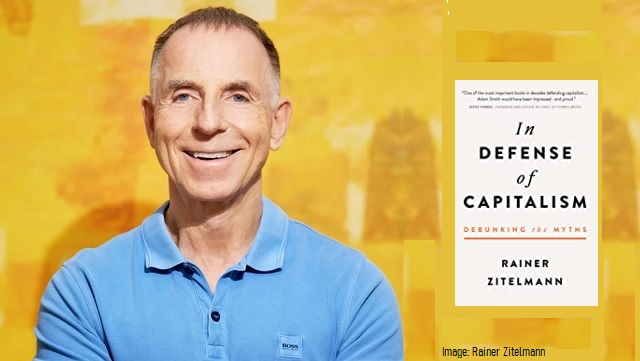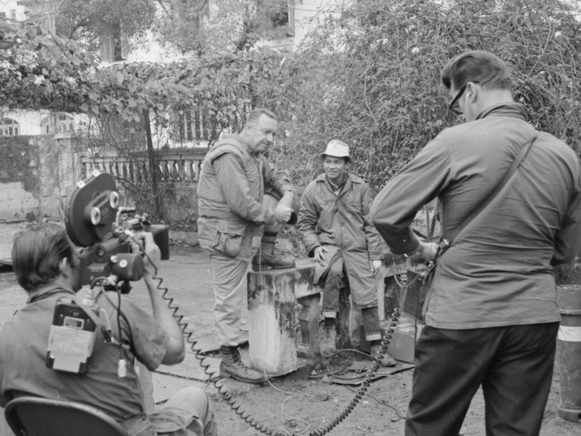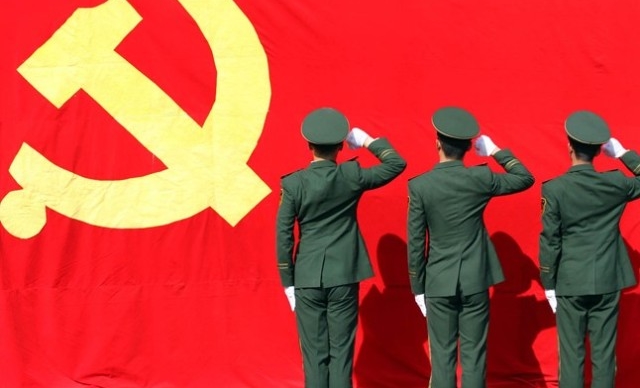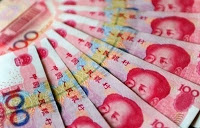European Author Explains the Massive Disconnect between Young and Old Americans on Capitalism

FEE recently sat down with German author Rainer Zitelmann to discuss his latest book, the global financial crisis, and the future of capitalism.
The great writer Henry Hazlitt once observed that the path to prosperity is achieved through production, and the best way to achieve production is to maximize incentives.
“And the way to do that, as the modern world has discovered, is through the system known as capitalism,” wrote Hazlitt, “the system of private property, free markets, and free enterprise.”
Despite the fruits of modern capitalism, free markets around the world find themselves under assault and in decline. I recently sat down with author and entrepreneur Rainer Zitelmann to discuss this phenomenon as chronicled in his latest book: In Defense of Capitalism.
In a wide-ranging discussion, the German author talked about central banking, the rise of planned economies, and the uncertain future of capitalism. [Editor’s note: The interview has been edited and abridged for clarity and concision.]
Q: Your book was recently released. It’s your twenty-seventh book, by my count. Who is this book targeted for?
I wrote this book for people who are pro market. Maybe more emotional or anti-socialist. To provide them with the facts and all the arguments so they can have the discussion. Whether it’s about poverty, inequality, climate change, or monopolies. It’s not a book written for anti-capitalists.
It’s written for a global audience. It was an attempt to reach people in every country. It’s an expensive process. Every country costs 14,000 Euros. No one helped me. I paid from my own pocket (laughs).
This book is published in 12 languages.
You’ve written many books. What makes this one different from your other books?
The difference is, first, I address all these arguments from anti-capitalists.
It helped to get this international approach. There will be editions in Italy, Sweden, the Czech Republic, Poland, Romania, the United States, the Netherlands, and many other countries. People in Albania can access it.
It includes a great deal of original research and surveys. It contains the biggest poll ever done on the image of capitalism, the most comprehensive.
What did you find?
I knew in the beginning that capitalism is a dirty word for many. I wanted to know how much. It’s not the word. Even if we don’t use the word, we still have a negative connotation. The difference is negligible.
Q: There’s a chapter in your book that breaks down attitudes about capitalism by country. But let’s first talk globally. What is the state of capitalism today?
I think it’s under attack almost everywhere in the world. When you compare the situation in the 1980s and 1990s with today it’s a huge difference. In the 80s we had Ronald Reagan and Margaret Thatcher. We shouldn’t forget Deng Xiaoping in China, he was very important. We had pro market reforms in Vietnam and Sweden and many other countries.
Today the situation is completely different. I read the last index of economic freedom from the Heritage Foundation. The US has the worst ranking since it started in 1995. There are sixteen European countries more capitalist than the US. The UK has its worst ranking ever. China has its worst ranking ever.
You see it everywhere. I don’t have to tell you about the United States. But in Europe we are heading the direction of a planned economy. It’s a total disaster right now. In China, we had these great economic reforms in the 1980s that made them so successful. Xi Jinping is now going back into the direction of more state intervention. In Latin America it’s much the same, right now in Chile, for example. One of the few exceptions, as I’ve noted, is Vietnam.
Q: I was surprised to see, from data in your book, that Americans have the second highest attitude toward economic freedom in the world. Can you explain?
Yes, it does. But it goes deeper than that though.
You see a huge difference in the perception of capitalism among Americans older than sixty and younger than thirty. Americans over 60, they are what Europeans think about Americans: pro markets, pro entrepreneurship.
They are very enthusiastic about it. We calculated this anti-capitalist and capitalist coefficient; Americans over sixty have one of the highest coefficients in the world. The younger ones, it’s slightly negative.
This is the biggest difference of all the countries we measured. There’s no other country in our survey where there’s such a large difference in age groups. In fact, in some countries you see the opposite, like in Italy. Young people in some countries are even more pro capitalist than older people. Not as a big a difference as it is in the United States, but it’s an inverse relationship.
That’s fascinating. What do you attribute this to? Why is there such a gap here in the US between younger and older generations in their perceptions on capitalism.
I’ve thought a lot about it. I don’t know if I have the answer.
Of course first you think about schools and universities. Every day they tell students about the evils of capitalism. But to be honest, this is also true in a lot of other countries. Maybe it’s worse in the United States, I don’t know. But if you go to Europe, universities are also this way.
Again, one exception is Vietnam. I was invited by four different universities, and had a lecture in Hanoi at Foreign Trade University, which is one of the best universities. They invited me to do a workshop on how to improve the image of rich people. Can you imagine a workshop like that at a university in the US (laughs)?
I have another theory as well. Take someone who is 30 today. In 2008, he was about 15 years old and paying attention to politics for the first time. The first thing he heard is there’s a financial crisis and this is caused by capitalism, and almost everything breaks down. This is the first political experience in his life!
Of course, you and I know that this was not a crisis of capitalism. This crisis was not because of a lack of regulation. But it’s not important what you and I think. Their interpretation is important. And for many young people this was the first experience in their political life.
And then there are other things like student loans and other problems. I don’t think there’s one answer but many.
You should know better than I. You live in the United States. What is your answer?
Hey, I’m asking the questions here. Just kidding. I agree that universities and schools play a big role. They have grown more naked in their anti-capitalism in recent years. I think culture plays a big role. Movies. Television …
By the way, sorry to interrupt you.
Not at all.
You mention movies. You should read a book I wrote on this. It was published by Cato: The Rich in Public Opinion. I have one chapter in this book—we had very detailed research about Hollywood movies, and how rich people are portrayed in Hollywood movies. It’s the first book about prejudice against rich people. Rich people as a minority.
There are so many books about prejudice against people. Against black people. Gay people. Overweight people, and whatever. There was not a single book on prejudice and stereotypes against wealthy people.
It was great stuff. We looked at more than 600 movies, and in the end we looked at 43 in which rich people played an important role. And you’re absolutely right…rich people were portrayed overwhelmingly negatively.
Your book is about capitalism, but it’s hard to talk about that without talking about socialism a little. I was in middle school when the Berlin Wall came down. The Soviet Union collapsed not long after. Yet Marxism seems to be thriving again in many parts of the world in various forms. Does that surprise you?
Yes and no. That was a long time ago. The younger generation hasn’t lived in a world with socialism. For them it’s only history. Of course they should learn this in school, but teachers don’t tell them about it.
I do lectures all over the world, and I have one test question I ask students when I visit them in Asia, Europe, the United States, and Latin America. I ask them, Have you heard about Mao’s Great Leap Forward at the end of the 1950s in school?
Whether I’m speaking to thirty people, three hundred, or three thousand, I ask this question. Very few people say yes. They haven’t heard about it! This is the biggest socialist experiment in history. Forty-five million people died. I write about this at length in my book The Power of Capitalism. They haven’t heard about it at school. And socialism is not part of their experience, and if teachers don’t tell them at school, most are not going to learn about it.
In universities, education is very left-leaning. I saw a statistic recently about the United States. In the 1980s, the ratio of left-leaning professors to conservative professors was 3-2. Today it’s 12-1. If you look at assistant professors, it’s about 45-1, or something like that.
So this is part of the explanation.
But not all of it.
No, no.
I also have this theory. Sooner or later people in most countries simply forget why they became successful. It happens almost everywhere in the world. Look at Chile. Chile was the most successful in Latin America for a very long time. Compare them to Argentina or Brazil or wherever. It happened because they were mostly capitalist. Now they voted for a socialist. [Editor’s note: In 2021, Chileans elected Democratic Socialist Gabriel Boric.]
They forgot why they became successful. The same thing has happened in Germany. We became prosperous because of Ludwig Erhard’s market economy. People forget it, and they go more in the direction of a planned economy.
Why did the United States become successful? Because of capitalism. But people forget it.
Look at China. What happened there was amazing. In 1981, 88 percent of the Chinese people lived in extreme poverty. Today it’s less than 1 percent. This started with Deng Xiaoping’s pro market reforms, and the introduction of private property.
I have a friend in China who wrote one chapter in this book. Zhang Weiying. He’s an economist at Peking University. He always says, “we became successful not because of the state but in spite of the state.” But this is what people forget. China today is going the other direction. This happens in almost all countries.
And then there are capitalists themselves.
Capitalists? I think I see where you’re going. Can you explain?
Sometimes I think the biggests problem is not anti-capitalists. Left-leaning people are not the problem. The problem is that people who should defend capitalism often do not. I speak especially about entrepreneurs. They are silent. This is a big problem.
In my first pages in my book, I have a quote from the founder of Whole Foods.
Yes, I saw that quote. John Mackey.
John Mackey, yes. I met him last year at a Students For Liberty conference in Miami. The CEO of SFL, Wolf von Laer, is a friend. He interviewed and praised Mackey for his book on capitalism and for opposing Obamacare. But do you know what [Mackey] said during this interview?
No.
He said, I wouldn’t do it again. Because of the sanctions from the left, and the boycotts of his company, and because he was targeted so much. And I understand it. Entrepreneurs don’t have to be heroes in politics; they have to be heroes in the economy. And it’s hard to be a hero in the economy and a hero in politics at the same time. So many are silent. Sometimes they give some money to free market think tanks. But this is a big problem: people who should defend capitalism don’t.
But you do. Is that why they call you “the big biceps of capitalism” in Germany? I notice you’re a pretty buff guy for someone in his 60s. What’s your secret?
I have been training with weights for 45 years. Always natural, no doping. I do not train long, usually only 30 minutes, but 4 to 6 times a week.
Back to business. What are the biggest threats to capitalism today? One you’ve identified already: time. People seem to forget. But what else?
It’s the development more and more of the planned economy. They don’t call it a planned economy, but of course it is. In a market economy, entrepreneurs decide what to produce; in the end, consumers decide what to produce. In a planned economy, government officials decide what to produce. And this is what we’re seeing today.
In Europe, the EU is forbidding internal combustion engines for cars. It means you as a consumer don’t decide what car to buy. Government tells you what car to buy. I think it will be a big disaster.
We have this development in Germany. They are transforming it from a market economy to a planned economy. First they banned nuclear power plants. Then they started to phase out coal power plants. They forbid fracking. Now they’re importing fracking gas from the United States. They made us dependent on Russian gas. It’s crazy. It’s an idolatry.
And what’s happening now? Our companies are leaving because of regulations and because we have the highest price for electricity in the world.
So BASF, the largest chemical company in the world, leaves Germany and goes to China. And automobile companies also say they’re leaving.
Joe Biden and others want to do similar things in the US. With the Green New Deal and so forth. They don’t call it a planned economy, but it is. This is a major threat.
And how about the global financial system?
Yes, that is of course a big problem: the crazy policies of central banks. They set themselves in a trap. We might be heading for another financial crisis, and I predicted all this in The Power of Capitalism.
You did?
Yes. Here is what I wrote (grabs his book, begins reading):
“Misdiagnosing the causes of the [2008] financial crisis means that the proposed therapies are also wrong. The financial crisis was caused by excessively low interest rates, heavy-handed market interventions and over-indebtedness. Are we seriously to believe that the right therapy involves even lower interest rates, stronger market interventions and more debt? These measures may well have a short-term impact, but markets are becoming increasingly dependent on low interest rates. Such low interest rates do nothing to solve the underlying problems — they only suppress the symptoms and push them into the future. The current combination of overly excessive regulation and interest rates of zero will cause considerable medium-term problems for many banks and is the breeding ground for new, even more severe crises.”
This is what I wrote in the book and this is what has happened. This is the next problem with central banks, not only the Federal Reserve but also the European Central Bank. They act like planning authorities.
A lot of people say we have no choice. Because climate change.
Of course that is part of the discussion. Chapter three in my book talks about this. I read a couple weeks ago the new book by Greta Thunberg (The Climate Book: The Fact), the Swedish climate change activist. The only thing I found in this book is that we should abolish capitalism (laughs). I explain in my book why that’s a bad idea.
Now, I don’t belong to the group of people who say it’s all a conspiracy. I think it’s a real threat, though maybe exaggerated. I don’t think it’s as bad as some tell us. I think there is a threat but I’m a hundred percent sure a planned economy has never solved any problem in history, particularly environmental ones. They’ve caused more environmental problems than any other system. So I think it’s foolish to believe this will be the first problem solved by a planned economy.
From our discussion, I get the feeling you are not very optimistic about the future of capitalism—at least right now. So, I guess I’ll just ask: Will we see a resurgence in free markets over the next few decades or a continued rise of statism and centralization?
If I look right now, there are more reasons to be pessimistic than optimistic. But by nature, I’m more of an optimist.
I spoke recently with Madsen Pirie, founder and president of the Adam Smith Institute in the UK. He’s older now, like 83. [Editor’s note: He’s actually 82.] He knew Hayek and Margaret Thatcher and others. He told me he believes the ideals will remain in the world, and there will always be countries that go in this capitalist direction, and they will be role models for others. Other countries will see that it works.
So, I don’t know, to be honest.
The good thing is I’m a historian, so I know you can predict some things. But history is full of surprise. Sometimes positive surprise, sometimes negative surprise. Let’s hope for positive surprise.
AUTHOR
Jon Miltimore
Jonathan Miltimore is the Managing Editor of FEE.org. (Follow him on Substack.)
His writing/reporting has been the subject of articles in TIME magazine, The Wall Street Journal, CNN, Forbes, Fox News, and the Star Tribune. Bylines: Newsweek, The Washington Times, MSN.com, The Washington Examiner, The Daily Caller, The Federalist, the Epoch Times.
EDITORS NOTE: This FEE column is republished with permission. ©All rights reserved.








